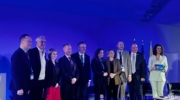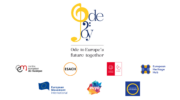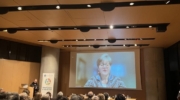Just published: Ambitious European Framework for Action on Cultural Heritage
Precisely one year after the launch of the historic European Year of Cultural Heritage in Milan in December 2017, the European Commission unveiled an ambitious European Framework for Action on Cultural Heritage with a view to sustaining the legacy of the Year and building on the many new initiatives launched in 2018. On the occasion of the Closing Conference of the European Year on 7 December 2018, European Commissioner Tibor Navracsics announced at a press conference that the European Framework for Action on Cultural Heritage will ensure “that the legacy of the European Year lives on, and that cultural heritage remains at the top of the political agenda”. The Commissioner added that “the actions will include research projects, funding opportunities, as well as cooperation with stakeholders and international organisations. Overall, the Framework puts forward over 60 actions that will be implemented in 2019 and 2020.”
📣BREAKING NEWS: European Commission launched European Framework for Action on Cultural Heritage! We strongly welcome this initiative to sustain legacy of #EYCH2018 for #FutureofEurope👏#BerlinCallToAction @europe_creative @EPCulture @Kulturerbejahr @kulturgutschutz @EU2018AT https://t.co/KdOehLXiCp
— Europa Nostra (@europanostra) December 7, 2018
The European Framework for Action seeks to build on the momentum of the European Year of Cultural Heritage, both in terms of wide-ranging mobilisation of stakeholders from civil society as well as of the quality and scope of the initiatives launched and bridges built with other policy fields. Here, the Framework explicitly refers to the involvement of the European Heritage Alliance 3.3. The European Framework also prominently refers to the Berlin Call to Action: ‘Cultural Heritage for the Future of Europe’ as key example of stakeholder mobilisation, thereby acknowledging the key role of Europa Nostra and its partners the German Cultural Heritage Committee and the Prussian Cultural Heritage Foundation which jointly presented the Berlin Call to Action in June 2018.
The European Framework, whose actions will be implemented over the next two years, should provide a long-term framework on cultural heritage for the EU institutions and will complement the Work Plan for Culture 2019-2022 recently adopted by the EU Council of Ministers. This document defines four principles (a forward-looking approach, a mainstreaming and integrated approach, evidence-based policy making and multi-stakeholder cooperation) and five pillars of action focusing on inclusiveness, sustainability, safeguarding endangered heritage, innovation and reinforcing international cooperation (see factsheet). Moreover, it foresees the setup of a Cultural Heritage Forum – an “informal Commission expert group” (Commission staff working document ‘European Framework for Action on Cultural Heritage’, p. 5.) – as a “platform for consultation and exchanging ideas and best practices”. This platform will build on and further develop the fruitful governance framework that was initiated for the European Year between the national coordinators and the Stakeholders Committee, of which Europa Nostra and 18 networks of the European Heritage Alliance 3.3 were members.
In a first reaction communicated from the Closing Conference in Vienna, Europa Nostra’s Secretary General Sneška Quaedvlieg-Mihailović welcomed the ambitious plan and congratulated Commissioner Navracsics for his commitment to ensuring the legacy of the European Year of Cultural Heritage. “This plan fully builds on the many partnerships and initiatives which have been strengthened or launched during the last 12 months. I am particularly proud that it gives such a prominent reference to our Berlin Call to Action. This forward-looking Action Plan also duly acknowledges the hard work and fruitful collaboration of civil society stakeholders with the national coordinators and the European Commission services”, she stated. Sneška Quaedvlieg-Mihailović also confirmed that Europa Nostra will actively contribute to the implementation of the European Framework of Action on Cultural Heritage giving special emphasis to the due involvement and engagement of civil society stakeholders.
Europa Nostra’s Secretary General, who attended the Closing Conference together with Europa Nostra’s Vice-President Piet Jaspaert, also stressed that Europa Nostra especially applauded the EC decision to set up a Cultural Heritage Forum. Referring to action 7 of the Berlin Call on ‘Building on the momentum’ which stressed the need to “find a more adequate formula for a more permanent platform for gathering knowledge, capacity building and coordinating advocacy for cultural heritage in Europe”, she expressed confidence that the future Cultural Heritage Forum will contribute to this important objective.
We applaud the initiative to keep up the momentum of this year👏as called for in #BerlinCallToAction: “ambitious European Action Plan for Cultural Heritage as a lasting legacy of the European Year of Cultural Heritage”! @Kulturerbejahr @kulturgutschutz @europe_creative @EU2018AT https://t.co/o5y9LLeU9g
— Europa Nostra (@europanostra) December 7, 2018
The European Framework for Action also takes stock of the many initiatives and activities launched during the European Year, citing also initiatives from members of the European Heritage Alliance 3.3 such as (non-exhaustive)
- Interpret Europe (toolkit ‘Engaging citizens with Europe’s cultural heritage’),
- Civilscape,
- E-FAITH,
- NEMO (training of museum professionals),
- Future for Religious Heritage (Torch initiative),
- European Route of Industrial Heritage (‘Work it out’ dance event),
- European Historic Houses Association (Europe’s Private Heritage Week),
- EFFORTS (European Fortress Day),
- NECSTour (Declaration ‘Better Places to Live, Better Places to Visit’ in cooperation with the European Travel Commission, Europa Nostra and the European Cultural Tourism Network with the support of the European Heritage Alliance 3.3),
- Architects’ Council of Europe (Leeuwarden Declaration on ‘Adaptive re-use of the built heritage: Preserving and enhancing the values of our built heritage for future generations’, which will be further disseminated in 2019,
- Europa Nostra (European Heritage Awards and 7 Most Endangered programme),
- E.C.C.O. (European Week of Conservation-Restoration)
- Europeana
- European Historic Houses Association and the European Landowners’ Organisation (project on innovative business models for private heritage houses which will conclude with a conference and a study in 2019).
Referring to these prominent contributions of members of the European Heritage Alliance 3.3, Europa Nostra’s Vice-President Piet Jaspaert, who is also long-standing moderator of the Alliance, said: “On behalf of the Alliance, I can say that we appreciate this prominent mention in the European Framework for Action and that all Alliance members are ready to contribute to sustaining the legacy of the European Year together.”
Background information
Ever since the European Commission had announced in May 2018 that it would propose an EU Action Plan for Cultural Heritage, stakeholders like Europa Nostra have continuously emphasised the need for an ambitious action plan so as to sustain the legacy of the European Year of Cultural Heritage, especially through the Berlin Call to Action: “Cultural Heritage for the Future of Europe”. This document was presented by Europa Nostra, the German Cultural Heritage Committee and the Prussian Cultural Heritage Foundation at the European Cultural Heritage Summit in Berlin in June 2018 and called for “an ambitious European Action Plan for Cultural Heritage as a lasting legacy of the European Year of Cultural Heritage” which should ‘be holistic and interconnected with other key EU policy agendas and priorities, (…) such as social cohesion, regional development, urban development, rural development, environment, maritime and tourism policies, sustainability agenda and climate change adaptation, research and innovation, digital policy, education and skills and, of course, the youth’FOOTNOTE: Footnote.
Further to a European-wide dissemination campaign including translations into more than 23 European languages, the Berlin Call to Action was signed by more than 2,018 citizens and organisations from all over Europe by November 2018. This symbolic number of signatures was handed over by Europa Nostra and the German Cultural Heritage Committee (DNK) to the European Commission on the occasion of the closing conference in Vienna.
Thumbnail picture: © Creative Europe







